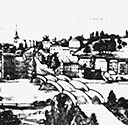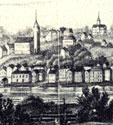
Haverhill
 One of Whittier’s latter poems was written about three years before his death at the request of the Haverhill Board of Trade for a celebration of the two hundred fiftieth anniversary of the settlement of Haverhill.
One of Whittier’s latter poems was written about three years before his death at the request of the Haverhill Board of Trade for a celebration of the two hundred fiftieth anniversary of the settlement of Haverhill.
Haverhill
1640-1890
Read at the Celebration of the two Hundred and Fiftieth Anniversary of the City, July 2, 1890.
Whittier begins with the Merrimac River and imagines going back in time.
O river winding to the sea!
We call the old time back to thee;
From forest paths and water-ways
The century-woven veil we raise.The voices of to-day are dumb,
Unheard its sounds that go and come;
We listen, through long-lapsing years,
To footsteps of the pioneers.
Should he be able to go back, this is what he would see.
Gone steepled town and cultured plain,
The wilderness returns again,
The drear, untrodden solitude,
The gloom and mystery of the wood!Once more the bear and panther prowl,
The wolf repeats his hungry howl,
And, peering through his leafy screen,
The Indian’s copper face is seen.We see, their rude-built-huts beside,
Grave men and women anxious-eyed,
And wistful youth remembering still
Dear homes in England’s Haverhill.
He would experience the horrors of the French and Indian Wars.
The terror of the midnight raid,
The death-concealing ambuscade,
The winter march, through deserts wild,
Of captive mother, wife, and child.Ah! Bleeding hands alone subdued
And tamed the savage habitude
Of forests hiding beasts of prey,
And human shapes as fierce as they.
And watch the gradual redemption of the wilderness by the settlers.
Slow from the plough the woods withdrew,
Slowly each year the corn-lands grew;
Nor fire, nor frost, nor foe could kill
The Saxon energy of will.
And finally he gets to the Haverhill of 1890.
That hamlet now a city is,
Its log-built huts are palaces;
The wood-path of the settler’s cow
Is Traffic’s crowded highway now.As far and wide it stretches still,
Along its southward sloping hill,
And overlooks on either hand
A rich and many watered land.
But not all of nature has been lost in 1890 Haverhill.
And Nature holds with narrowing space,
From mart and crowd, her old-time grace,
And guards with fondly jealous arms
The wild growths of outlying farms.Her sunsets on Kenoza fall,
Her autumn leaves by Saltonstall;
No lavished gold can richer make
Her opulence of hill and lake.
He commends the first settlers on their choice of location.
Wise was the choice which led our sires
To kindle here their household fires,
And share the large content of all
Whose lines in pleasant places fall.More dear, as years on years advance,
We prize the old inheritance,
And feel, as far and wide we roam,
That all we seek we leave at home.
Whittier tells his listeners not to be upset by the change from agricultural to manufacturing.
And if the old idyllic ease
Seems lost in keen activities,
And crowded workshops now replace
The hearth’s and farm-field’s rustic grace;No dull mechanic round of toil
Life’s morning charm can quite despoil;
And youth and beauty, hand in hand,
Will always find enchanted land.No task is ill where hand and brain
And skill and strength have equal gain,
And each shall each in honor hold,
And simple manhood outweigh gold.
He then urges his audience to be true to their heritage, with a little light, hope and sweetness added.
O dwellers by the Merrimac,
The heirs of centuries at your back,
Still reaping where you have not sown,
A broader field is now your own.Hold fast your Puritan heritage,
But let the free thought of the age
Its light and hope and sweetness add
To the stern faith the fathers had.
Finally he concludes with a farewell message, perhaps thinking about his own death.
As tenants of uncertain stay,
So may we live our little day
That only grateful hearts shall fill
The homes we leave in Haverhill.The singer of a farewell rhyme,
Upon whose outmost verge of time
The shades of night are falling down,
I pray, God bless the good old town!
Full text of "Haverhill"

